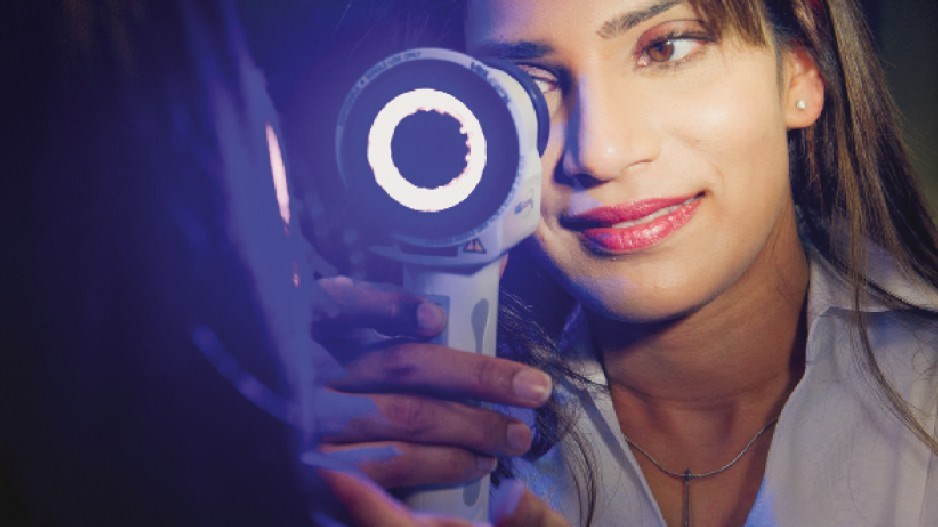There is good and bad news on the cancer scene.
The bad news is that oral cancer is on the rise in young people, due to an increase in orally transmitted HPV virus – the same virus that causes genital warts and increases the risk of cervical cancer.
The good news is that there is now an optical screening device called the VELscope that dentists can use in routine exams to spot oral cancer in its early stages.
And for LED Medical Diagnostics Inc. (TSX-V:LMD) – the Burnaby company that developed the device – it is very good news indeed.
The newest version of the handheld optical scan – the VELscope Vx – is selling like hotcakes, thanks to widespread endorsement of the product by large American dental care companies and the National Dental Advisory Board.
LED Medical's subsidiary – LED Dental – sold 3,500 VELscopes last year. More than 10,000 have been sold worldwide, so far – 95% of which are in the U.S. And it is now available in 23 countries.
The company's revenue has more than tripled in one year, from $1.6 million in 2010 to $7.1 million in 2011.
The man behind LED Medical's success is Peter Whitehead, a reluctant researcher-turned CEO who developed the technology as a scientist working with the BC Cancer Agency in the 1990s.
LED Medical was one of two optical cancer screening companies that were spun out of the BC Cancer Agency. The other was Verisante Technology Inc., which has developed a skin cancer scan called the Verisante Aura.
"The Verisante guys are actually co-authors of some of my patents," said Whitehead. "There's a lot of cross-fertilization."
The human body has natural fluorophores – chemicals that can emit light when excited by certain wavelengths of light. When there are anomalous changes in biochemistry – which can be caused by rapid cell growth – it causes a shift in the light's wavelengths.
Under the VELscope, healthy tissue glows apple green. Diseased or cancerous tisue shows up dark.
Since it could be just a canker sore or a burn in the mouth, the dentist will typically schedule the patient for a followup scan in two weeks, and if the biomarkers are still detected, a biopsy can be taken.
Whitehead's team originally worked on a screen for cervical cancer, but then switched to oral cancer.
In 2003, Whitehead decided to commercialize the technology and raised $2 million to start the company. The VELscope was developed with the help of a substantial amount of American and Canadian government and health agency funding – $50 million worth – including the National Institutes of Health in the U.S.
Even before the company got FDA approval to sell the device in the U.S, some of the world's largest dental companies came knocking.
"There were several opportunities to sell it at the time," Whitehead said.
Rather than sell, Whitehead raised $5 million to build a commercial product and launched it in Canada and the U.S.
Once the company was up and running, he stepped back to let someone else handle the CEO's role.
"I don't have founderitis, which I call inflammation of the founder's head," Whitehead said. "I knew that my strength was a product development guy rather than a marketing guy."
The company went through a couple of CEOs before Whitehead agreed to step back into the role in 2009, and managed to cut the cost of the components down by nearly half and get the large cumbersome scope down to more convenient size. They now sell for $2,750.
Most of the device's components are made in China and are assembled at LED Medical's Burnaby plant, which employs 25 people.
Amy Nunrha, owner of the Vancouver Airport Dental Centre, bought a VELscope in November.
"It's extremely easy to use," she said. "We use it routinely. The Oral Cancer Foundation recommends an oral cancer screening exam every year. So in addition to a visual exam, we're doing an exam once a year using the VELscope on every patient."
The cost of the scan is about $32, and most dental or medical plans cover the cost, Nunrha said.
So far, none of her patients has been diagnosed with oral cancer.
While Whitehead's company is mainly focused on the VELscope for now, the company is also working on using the same technology for other types of cancers.
"There's several different natural applications, and we are expecting to launch another device later this year in the dermatology world, and we're going to be looking at some of the colo-rectal applications in the New Year." •




